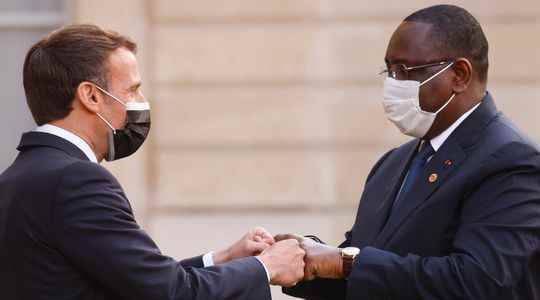It will be a question of looking good in front of the cameras. The 80 European and African leaders gathered on February 17 and 18 in Brussels will display the smiles of rigor for the traditional family photo. The summit between the European Union and the African Union will be that of “renewal”, it is officially affirmed, in Brussels as in Paris. The opportunity for an “aggiornamento” slips the Elysée. The goal? Propose a partnership based “on exchange and sharing” specify in a joint forum, on February 15, the Senegalese President Macky Sall, at the head of the African Union, and the President of the European Council Charles Michel.
Behind the scenes, however, many diplomats are in low spirits. Because the enthusiasm displayed in public struggles to hide the growing unease between the two continents. And this despite the EU’s major promise ahead of the summit: a vast investment program of 150 billion euros by 2027 in Africa, intended to compete with China. “I am usually considered an optimist but sincerely there is very little reason to be enthusiastic, regrets economist Carlos Lopes, professor at the University of Cape Town, South Africa. As a prelude to the Summit, we has once again heard unilateral announcements from the Europeans, without prior negotiations or consultations. We know these announcement effects. I have lost count of the number of plans and strategies on Africa.”
Obstacle course
Proof of the deleterious climate between the two institutions, bringing together their heads of state required a great deal of energy and diplomacy. The organization of this great race, the sixth of its kind, has turned into an obstacle course. Scheduled for 2020, the meeting was initially postponed, officially due to Covid-19. In reality, the negotiators did not agree on anything… or almost. The agenda, the timing, the guests… Almost two years later, mistrust remains. And sometimes the devil is in the details. Even before the opening of the summit, the African Union thus buried the term “Alliance Africa Europe” proposed by the European presidency. As for the name “Euro-African summit”, some consider it too close to “Eurafrique”, an old doctrine with colonialist overtones, as explained by in a recent article researchers Peo Hansen and Stefan Jonsson.
At a time when anti-Western sentiment is rising on the continent, the skepticism of African heads of state with regard to their European counterparts is growing. The security crisis in the Sahel, where Western interventions have failed to stem the progress of the jihadists, has fueled this bitterness, willingly stoked by foreign trolls and certain local governments, to the point of causing the virtual rupture between France and Mali.
As for the Covid-19 pandemic, it has contributed to further deteriorating relations, by raising the thorny question of access to vaccines, Barely 12% of the African population is vaccinated, compared to more than 70% of Europeans . “Europe has done what it had to do,” said the Elysée, on the same line as Brussels. In addition to deliveries via the Covax initiative, the EU has shipped “more than 145 million European doses to Africa and intends to triple this volume by February 2022”, specifies this source.
The lifting of patents, a bone of contention
But this assessment omits the standoff that has been going on for months over an African request: the lifting of patents to give the continent the means, in the long term, to produce its vaccines. The request was repeatedly swept aside on the pretext that the priority was elsewhere, most of the requesting countries not having the production capacities. “That’s right. But given the state of our relations, we now need measures capable of restoring trust between the two parties, said Théodore Murphy, head of Africa programs at the European Council for International Relations (ECFR). ), a think tank based in Berlin. Of course, if we approve the lifting of patents, vaccine production will not start tomorrow. But we could agree on the principle instead of opposing it outright. ”
The question is all the more pressing as South Africa claims to be almost ready to produce a vaccine at home. The Afrigen company announced on February 3 that it had succeeded in manufacturing a “copy” of the Moderna messenger RNA vaccine. The laboratory had made its formula available but without the details of the production techniques, essential for a reliable vaccine. South Africa and the World Health Organization are calling on Moderna to share its manufacturing secrets. So far to no avail.
In many ways, the vaccine debate reflects the difficult software shift of Europe-Africa relations. “What we need is to get out of the model based on the sole exploitation of our raw materials to move towards a real industrialization of African economies” pleads Carlos Lopes. The change is underway, tempers the Elysée, which recalls that “Europe will contribute to helping Africa to produce its own vaccines.” In addition to South Africa, Rwanda, Senegal and possibly soon Ghana should soon open their own factory.
In other key areas such as the production of green energy, the model promoted by Europe, which sees Africa (North Africa in particular) as a land for massive investment in solar and wind power, is also giving rise to concerns. “With renewable energies, we must at all costs avoid falling into the same paradigm as before, namely a logic of extraction” warns analyst Theodore Murphy.
The Europeans are expected at the turn and not only by the Heads of State. African civil societies demand a partnership “of equals”. Not so simple when you know that the African Union is partly financed by… the European Union.
